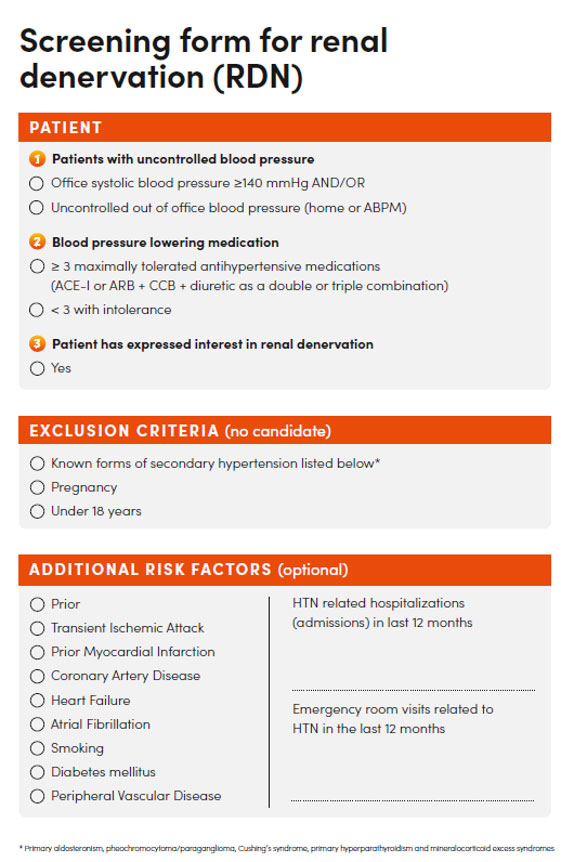PATIENT SELECTION FOR RENAL DENERVATION
Who is a candidate for Ultrasound Renal Denervation?
Ones who have tried all other options
Patients who have been unsuccessful on a number of different medications (despite compliance and lifestyle adjustments), and who may have already been treated with beta blockers and spironolactone or other potassium-sparing diuretics.
67 year-old male; uncontrolled hypertension on 5+ medications with coronary artery disease
Ones who are resistant to medications
Patients with resistant hypertension who have not met optimal blood pressure with medications and lifestyle changes (no secondary causes and appropriate renal arteries); Patients that are on 3+ medications and are still elevated.
68 year-old female; resistant hypertension with 3+ medications
Ones who cannot tolerate medications
Patients who cannot tolerate medications, including ACEs, ARB, CCB and Thiazides.
55 year-old male; uncontrolled hypertension with intolerance to medications
Ones who are not adherent to taking their blood pressure medications
Patients with elevated blood pressure with different medications and documented non-compliance.
52 year-old female; uncontrolled hypertension with 4+ medications with documented non-adherence
“We have ten years of experience with renal denervation. We have treated several hundred people, very different patients. We have had very good experiences, especially with those who are younger and who have severe high blood pressure.”
Dr. med Karl-Philipp Rommel – Cardiologist & Renal Denervation Specialist
“We have ten years of experience with renal denervation. We have treated several hundred people, very different patients. We have had very good experiences, especially with those who are younger and who have severe high blood pressure.”
Dr. med Karl-Philipp Rommel – Cardiologist & Renal Denervation Specialist
*Case descriptions are for educational purposes only; not real patient cases. There are additional factors to consider to determine if Paradise uRDN is right for your patients and may require shared decision making with a team of medical specialists to assess risks and benefits. See Important Safety Information below. Refer to the IFU for more information prior to considering the Paradise uRDN treatment.
Contraindications
- The Paradise Catheter is contraindicated in any of the following:
- Renal arteries diameter <3 mm and >8mm
- Renal artery Fibromuscular disease (FMD) Stented renal artery
- Renal artery aneurysm
- Renal artery diameter stenosis >30%
- Pregnancy
- Presence of abnormal kidney (or secreting adrenal) tumors
- Iliac/femoral artery stenosis precluding insertion of the catheter
Warnings
- Failure to use the recommended balloon size may result in renal artery stenosis, dissection, perforation, aneurysm, significant vasospasm requiring intervention, ablation of unintended tissues or structures, and/or no ablation of target tissue achieved.
- Energy emission in an unintended location may result in unintended tissue damage.
- Do not move the Paradise Catheter during sonication.
- Do not sonicate in renal artery at locations with visible plaque.
- Do not deliver sonications in an overlapping arterial target zone.
Precautions
- Patients with known allergy to contrast medium may be at increased risk of hypersensitivity reactions.
- Only use specified coolant (Sterile water) for fluid supply. DO NOT USE SALINE.
- Avoid multiple balloon inflations to achieve apposition of the balloon to the renal artery wall; multiple balloon inflations may result in increased vessel trauma.
- The Paradise Catheter is for single use only. Do not resterilize or reuse. Reuse, reprocessing, or resterilization will compromise device integrity which may result in patient injury, illness, or death. Do not touch the Paradise Catheter balloon during sonication, as it may result in serious injury.
- The Paradise System may interfere with or adversely affect the operation of cardiac pacemakers or other active implants, unless proper precautions have been taken or managed per the manufacturer’s instructions. When in doubt regarding possible hazards, seek qualified advice and/or consult with the manufacturer(s) prior to initiating a procedure. The Paradise Catheter is a Type CF, defibrillation-proof Applied Part.
Potential risks of renal denervation procedure/response to treatment
Ablation or thermal injury to vessel, adjacent tissue or other structures, Acute kidney injury, Angina, Anxiety, Arrhythmia, Atrial tachycardia, Bradycardia, Gastrointestinal complications (diarrhea, nausea, vomiting), Hypotension/ Dizziness and/or Headaches, Hypertension, Hyperhidrosis, Pain (transient abdominal, lower back), Renal failure or renal insufciency, Renal artery aneurysm or pseudoaneurysm, Renal infarction, Renal artery dissection, or perforation, Renal artery stenosis, Vasospasm, Vasovagal response, Stroke or transient ischemic event
Potential risks of arterial catheterization procedure
Allergic reaction to contrast, Arterio-enteric fifistula, Arterio-venous fifistula, Bleeding, Cardiopulmonary arrest, Complications related to pain and anti-anxiety medications, Death, Deep vein thrombosis, Edema, Embolism (pulmonary, renal, peripheral vasculature, plaque), Hematuria, Infection, Myocardial infarction, Pain, Vascular access site complications (pseudoaneurysm, pain, swelling, hematoma



